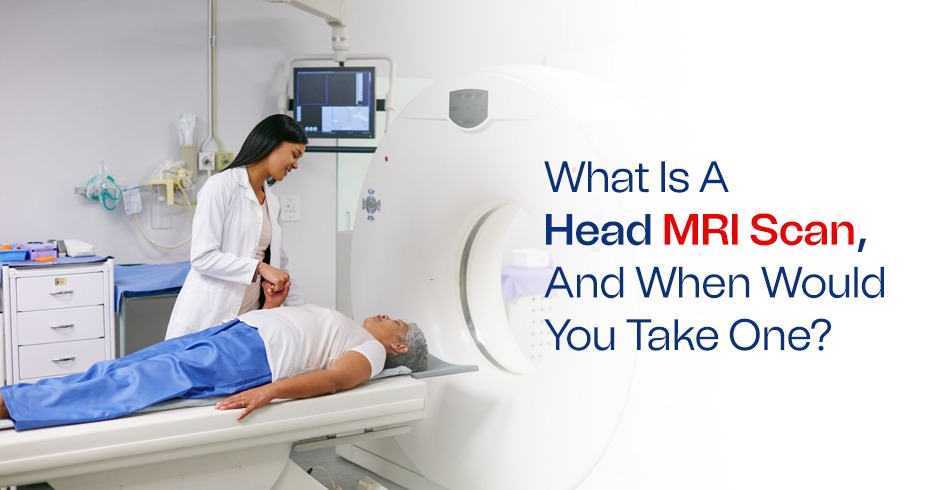A head MRI (Magnetic Resonance Imaging) scan is a non-invasive medical procedure that captures digital images of the brain and surrounding tissues using a powerful magnetic field and a computer. This test is non-invasive and radiation-free. Consult the best Radiology center to get the MRI.
Several conditions can be identified using a head MRI, including:
- Brain cancer
- Strokes
- Head trauma
- Several sclerosis
- Alzheimer’s condition
- Hydrocephalus
- Aneurysms
- Infections
A head MRI is also used to assess the brain before surgery, following surgery and to track the effectiveness of treatment for disorders of the brain.
How a Brain MRI Operates?
A strong magnetic field is used in a head MRI to align the body’s atoms. Then, when radio waves are sent through the body, the disrupted particles produce a signal. The MRI scanner then detects this signal and uses it to deliver body images.
Usually, head MRIs are carried out in a medical facility or clinic. The patient will be asked to lie down on the table of the MRI machine, which will be placed inside the MRI machine. A coil will be wrapped around the patient’s skull by a professional. The loop aids in both sending and receiving radio waves. Throughout the scan procedure, the patient must remain still.
Conditions that a Head MRI Can Diagnose
Several conditions can be identified using a head MRI, including:
- Brain tumors: When cells inside the brain begin to develop atypically, they transform into tumors. Such cell collections might be benign or cancerous. Brain tumors can be found, and their size, shape, and location can be determined using a head MRI.
- Strokes: A stroke occurs whenever there is an abrupt disruption in the blood supply to the brain’s arteries. Brain cells may die as a result of this. A head MRI can spot strokes and assess the degree of brain damage.
- Head injuries: Several issues can arise from head traumas, such as bleeding, edema, and brain damage. A head MRI can determine the severity of a head injury and any brain damage.
- Multiple sclerosis: An autoimmune condition primarily affecting the central nervous system, multiple sclerosis. Multiple sclerosis can be identified, and its severity can be determined using a head MRI.
- Alzheimer’s disease is a degenerative brain condition that results in dementia. The disease can be identified, and its severity evaluated using a head MRI.
- Aneurysms: Aneurysms are protrusions in the blood vessel walls. They have the potential to burst, resulting in deadly bleeding. An MRI of the head can be used to find aneurysms and determine their risk of rupturing. The problems with blood flow can be checked in the color Doppler test.
- Infections: Anything from bacteria to a tiny virus can cause brain infections. These can be identified, and their severity can be determined using a head MRI.
Benefits of a Head MRI
A range of disorders can be diagnosed using head MRIs. They offer precise images of the brain and other head structures and are non-invasive and radiation-free. Even the cost of a head MRI scan is relatively reasonable, particularly at facilities like Tesla Diagnostic Centre, where a further reduction is offered on the head MRI fee.
Among the advantages of a head MRI are the following:
- Precise diagnosis: A head MRI scan can assist in accurately diagnosing several disorders, including tumors, strokes, aneurysms, infections, and other abnormalities in the brain and surrounding tissues.
- Non-invasive: A head MRI scan uses no radiation, unlike other diagnostic imaging tests like CT scans or X-rays, making it a safer option for some patients.
- Versatile: Head MRI scans can assess a range of disorders, such as dementia, multiple sclerosis, and traumatic brain injury, and identify abnormalities early on.
Risks of MRI of the head
An MRI of the head carries minimal risk. A tiny percentage of people may experience minor side effects like nausea or vomiting after receiving an MRI. A minimal chance exists that the contrast material used occasionally during a head MRI will cause an allergic response.
The following are some possible dangers of a head MRI:
- Claustrophobic people may find it difficult to undertake an MRI scan since they must remain within a tight tube for an extended time.
- Metal implants: The high magnetic field of an MRI machine may impact metal implants, such as pacemakers, cochlear implants, and some forms of metal dental work, and may induce movement or heating in the implant.
- Contrast dye: Specific MRI scans include a contrast dye to improve the images, which can result in an allergic reaction in some persons. A response to the dye may be more likely among people with allergies or renal issues in the past.
- Acoustic noise: During the procedure, MRI machines make loud knocking or tapping noises, which can be upsetting or uncomfortable for some people.
The top diagnostic facility for an MRI head scan
The Tesla Diagnostic Centre is considered the top Radiology center in Hyderabad. Tesla Diagnostic Centre is ideal if you base your judgments on quality. If you evaluate a book by its cover, then yes, the facility might not be decked out in as much glitter as the billionaire health centers. We have the most affordable MRI head scan prices and Hyderabad’s most significant head MRI.
